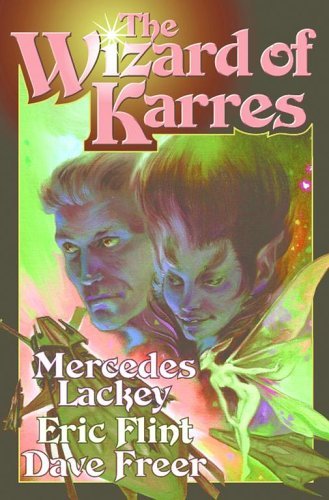 Falls Afoul of the Usual Perils of Pastichery Falls Afoul of the Usual Perils of Pastichery
The WIzard of Karres
Eric Flint, et al.
|
I must admit that i approached
this book with some trepidation, since i am, shall we say, not
particularly impressed with Eric Flint's "editing" (for want of a
better word) of the rest of the James Schmitz canon, nor with Lackey's
general record lately of not even keeping up with her own
series' backstories (see the reviews for Exile's Valor), and because i didn't have any
idea who Freer was.
(I have not yet gotten hold of a copy of an un-tampered-with edition of
Witches of Karres to see how extensively Flint
"edited" that volume; a quick skim of the Baen version showed nothing
immediately obviously egregious there, though.}
That out of the way, if this were an original story, i'd probably give
it four stars, rather than the three i have -- but if it were an
original story, i doubt it would have ever been published; it's a niche
story, and without Scmitz's brilliant original to follow up to, the
niche wouldn't exist.
As to the story itself: it falls prey to the most common problems
writers of pastiche run afoul of -- first of which is often trying to
put in references to everything from the original, whether the new
story needs them or not. Thus we have references to tinklewood fishing
poles and TotiSystem Toys, among other things. And lots and lots of
vatches.
Another problem writers of pastiche may trip over is a tendency to
retcons ("RETroactive CONtinuity") of the original story, explaining at
length things that need no explanation, which can be particularly
annoying if the retcon involves background material that wouldn't have
been available to the original writer (the explanation given here of
the formal name of one character from "Witches" is one such).
But, if those are your worst problems in writing such a work, then
you're doing pretty good, and Flint, Lackey and Freer have, indeed,
done Pretty Good.
The story is rather complex -- to say the least -- and i wouldn't even
try to summarise it, both because such a summary would of necessity be
both long and confusing and becuase it would, of necessity, involve at
least some amount of spoilers.
They have crested a complex political intrigue out of characters and
situations which were basically throw-aways in the first book, and play
it out well.
Mostly they succeed in mimicking Schmitz's almost laconic, low-key
narrative style, but depart from it in having parallel plots going at
various points -- i cannot remember any of Schmitz's own work that do
so, unless possibly it's the story that teams Telzey and Trigger -- and
in telling parts of the story from other viewpoints than Captain
Pausert's.
Their handling of Pausert's continuing discovery of his own abilities
at manipulating the mystical klatha energy that the Witches of Karres
use nicely mimick and continue Schmitz's handling of similar material
in the original, and the continuing development of Pausert and Goth's
relationship rings true.
Goth's sister, the Leewit, is along to add to the fun, and old
spacer(and burglar/spy) Vezzarn and former Imperial agent Hulik do
Eldel, now working with Pausert, are well used, although they do tend
to fade into the background when not needed stage front.
Pul, the grik dog, is just a bit too too.
The sequence in which the crew of the Venture, fleeing Imperial
Security, sinister aliens and the pirates of the Agandar (a pirate lord
vanquished by Pausert & Co in the first book) take refuge aboard a
circus ship is well-done, though i do question whether the plays of
Shakespeare would have survived virtually unchanged in the apparent
history that Schmitz set up in the first book, with Earth a virtual
legend of the distant past, so far off that even the name has become
"Yarthe".
In the end, all comes out well and right -- though with hints of
possibly another volume in the offing, and echoes of Prisoner of Zenda (or perhaps Heinlein's Double Star).
I do feel as if there are some inconsistencies in continuity -- mainly
that though i have the impression that Pausert & Co were again
running under the forged ship's papers and identities created for them
by the Daal's document specialists on Uldune, people who shouldn't have
the faintest idea that Captain Aron of the Evening Bird out of
Mulm and his niece Dani are actually Pausert of the Venture,
out of Nikkeldepain, and Goth, a possible Karres witch, keep calling
him "Pausert"...
One assertion i've noticed in a couple of reviews of this book is that
Schmitz never wrote a sequel; i understand that the situation is a bit
different -- that he did, indeed, write one, but that the manuscript
was lost and he never got around to reconstructing it. However, the
fact that H. Beam Piper's third Little Fuzzy novel, long
thought lost, finally did materialise, gives me some faint hope.
(And, while Schmitz had a fondness for odd-ball names -- i still
treasure "Gefty Rammer" -- somehow, "Vonard Kleesp" seems to me a bit
over the top...) |
|